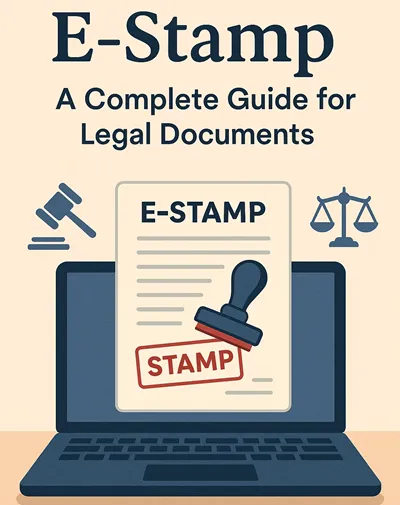
E-Stamp is an electronically generated stamp paper used to pay stamp duty online, instead of buying physical stamp papers. It is legally valid under the Indian Stamp Act, 1899, and issued through authorised agencies like SHCIL (shcilestamp.com) or state portals.
Purpose
Through E-Stamp, payment is paid of the stamp duty on agreements, affidavits, sale deeds, leases, mortgages, powers of attorney, etc.
Benefits
- Instant generation, no shortage of papers
- No risk of fake/duplicate stamps
- Accepted in courts and registration offices
- Verifiable online with UIN
Documents Allowed for E-Stamp
| Category | Examples |
|---|---|
| Property | Sale deed, Gift deed, Mortgage deed, Lease/Rent agreement (>11 months) |
| Financial / Business | Share transfer, Partnership deeds, Loan agreements, Promissory notes |
| Legal / Personal | Power of attorney, Affidavits, Settlement agreements |
| Other Agreements | Service contracts, License agreements, Joint venture agreements |
Note: Every state has different rules on which documents are allowed.
E-Stamp vs Physical Stamp Paper
| Feature | E-Stamp | Physical Stamp Paper |
|---|---|---|
| Medium | Digital | Paper |
| Legality | Valid under the Indian Stamp Act, 1899 | Equally valid |
| Fraud Risk | Verifiable and safer | Risk of fake stamps |
| Ease | Can be bought online | Requires vendor or treasury |
Fees
Stamp Duty: Paid online to state government; depends on document type and state.
Registration Fee: Paid separately at Sub-Registrar for property or other registrable documents.
Example
In Karnataka, for a property valued at ₹50 lakh:
- Stamp duty via e-stamp: ₹3 lakh
- Registration fee: ₹50,000
Key: E-stamp covers only stamp duty, not registration.
Can E-Stamp Replace Court Visits?
Buying e-stamp: Online → No court visit needed
Document registration: If required (sale deed, lease > 11 months, power of attorney), visit the sub-registrar office once.
Some states allow partial or full online registration: Delhi, Maharashtra, Karnataka, Tamil Nadu, Telangana, and Andhra Pradesh.
FAQs on E-Stamp
-
1. What is an e-stamp?
-
e-stamp is an online digital stamp paper to pay stamp duty.
-
2. Is an e-stamp legally valid?
-
It is valid under the Indian Stamp Act, 1899.
-
3. From where can I obtain an e-stamp?
-
SHCIL or specific portals of the state.
-
4. Can e-stamp be used for property papers?
-
Yes, for sale deeds, gift deeds, mortgages, and leases (>11 months).
-
5. Can I use an e-stamp for affidavits?
-
Yes, affidavits can be used like divorce, adoption, or general.
-
6. Are there fake e-stamps?
-
No, all e-stamps have their unique UIN, which may be verified online.
-
7. Do I need a court visit for e-stamp purchases?
-
It can be purchased online or through authorised centres.
-
8. Do I need to go to court for registration if I have an e-stamp?
-
Yes, for registrable documents such as sale deeds or long-term leases.
-
9. Is the stamp duty the same as physical stamp paper?
-
Yes, it is state-specific as to amount as per laws in each state.
-
10. Does e-stamp include the registration fee?
-
No, their registration fees are paid separately at Sub-Registrar.
-
11. What payment modes do they accept?
-
Net banking, debit/credit card, UPI, or authorised collection centres.
-
12. Can I print an e-stamp at home?
-
Yes, after online payment, you can download and print the e-stamp certificate.
-
13. Is an e-stamp legal in a court?
-
Yes, it is completely allowable.
-
14. What will the e-stamp for my business be?
-
Loan agreements, share transfers, partnership deeds, promissory notes.
-
15. Are there any state-specific rules?
-
Yes, specific states allow types of documents for e-stamping.
-
16. Do I verify an e-stamp online?
-
You can do verification through UIN on SHCIL or the state portal.
-
17. Can I use an e-stamp for rental contracts?
-
Yes, particularly for leases > 11 months.
-
18. Are any extra charges applicable for e-stamping?
-
No extra fee; only pay the stamp duty according to the nature of the document.
-
19. Which states endorse full e-registration?
-
Delhi, Maharashtra, Karnataka, Tamil Nadu, Telangana, Andhra Pradesh.
-
20. Can the e-stamp avert scams?
-
Yes, by using a Unique UIN and Online Verification, the risk of a fake or duplicated stamp is reduced.
Add new comment